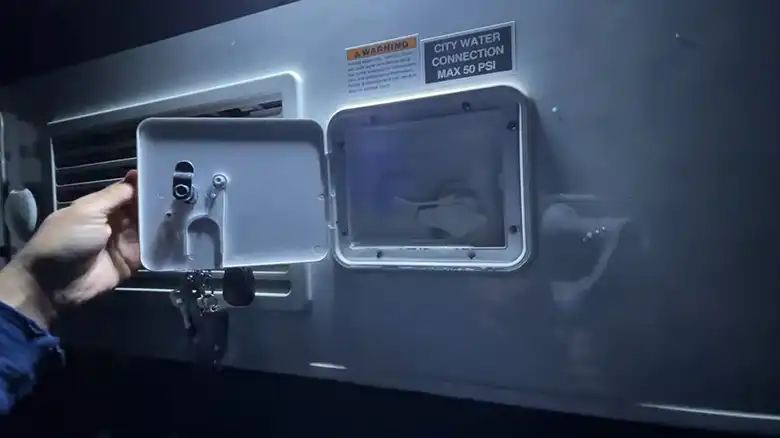RV propane detectors serve a vital purpose – alerting us to potential gas leaks that threaten safety. But the alarms themselves often become disturbances when detectors improperly trigger from low batteries, malfunctions, or environmental factors. As RVers, learning to interpret and troubleshoot propane detector beeping provides peace of mind and keeps travel safe regardless of those pesky false alarms.
We’ve all bolted awake to the deafening shriek of the propane alarm, fumbling in darkness to hush its incessant high-pitched wailing before neighbors complain. In those panic-stricken moments, it’s easy to resent detectors and their phantom cries. Yet overriding that unit or ignoring its signals of court catastrophe. Sledgehammer justice feels so satisfying in the moment, but solves nothing long-term.
Therefore, I’m here to help you by decoding the meaning behind your detector’s alarms, revealing the method behind its maddening beeps, and arming you to resolve issues once and for all. By learning what triggers false alarms and how to conduct repairs appropriately, propane detector beeping no longer holds the power to disrupt or endanger future journeys. So, let’s crack the code and tame those alarms!

Causes of RV Propane Detector Beeping
There are a few common triggers for your RV’s propane alarm beeping. The severity ranges from urgent to mundane, but you should investigate every alarm with vigilance.
Propane Leak
The most serious cause of a beeping gas detector is the presence of propane. Propane is heavier than air, colorless, and odorless. Gas suppliers add a pungent odorant to propane to make leaks detectable. If your detector smells gas, do not ignore it!
Follow these steps to check for leaks –
- Evacuate the RV immediately leaving doors/windows open
- Shut off propane tanks
- Determine the general area of potential leak using odor
- Test area with soapy water solution looking for bubbles
- Call a professional if the leak is confirmed for repair
Refrain from turning on ignition sources in the meantime. Getting a handle on even a minor leak quickly is paramount. Neglecting leak detection puts occupants at major risk.
Low Batteries
Like smoke detectors, propane alarms rely on battery power. If batteries run low, the detector will emit an intermittent beep about once a minute. Low batteries compromise the sensor and render it less effective at registering leaks.
Replace batteries in your RV gas detectors once a year or immediately when you hear the low battery warning. Use only manufacturer-recommended alkaline batteries. After battery replacement, test the detectors to ensure functioning sensors.
Faulty Sensor
Propane sensors have a typical 5-7 year lifespan under normal conditions. Over time, the sensor components degrade, increasing the chance of malfunction or failure. If your detector randomly beeps with no clear triggers, the sensor likely needs replacing.
Identify faulty sensors by testing them with compressed air. Short bursts of air should activate the alarm. If not, the sensor needs replacement. Install the same brand/model for seamless performance. Sensors are relatively easy for RV owners to self-install.
Environmental Triggers
Dense fumes from household cleaners, vehicle exhaust, perfumes, and paint can set off false alarms. Changes in temperature or humidity may also impact sensors. The alarms are extremely sensitive by design, sometimes to a fault.
Eliminate potential irritants by airing out the RV thoroughly—direct fans to ventilate the interior to see if it stops the beeping. If environmental factors are the culprit, the detector will likely stop once conditions stabilize.
Decoding Detector Alarms and Signals
Propane gas detectors produce distinct audio and visual cues to indicate the current operating status. Here is a breakdown –
| State | Audible Signal | Visual/LED Signal |
| Normal | None | Steady green flash every 60 seconds |
| Low batteries | Single chirp every 60 seconds | Red LED flash in sync with audible beep |
| Sensor malfunction | Repeated beeps every few seconds | No light |
| Gas alert | Repeated rapid beeps | Flashing red light |
Learning these indicators allows you to accurately interpret detector warnings. You can then take appropriate actions based on the alarm patterns.
Steps to Stop Your RV Propane Detector from Beeping
While the beeping alarms are frustrating, resist the urge to remove batteries or disable detectors. Use these tips to troubleshoot the true root cause in a safe manner.
Resetting Your RV Propane Sensor
Pressing the “Reset” button after a false alarm can cease the annoying beeping in some models. This essentially re-calibrates the sensor. Refer to manufacturer instructions for reset procedures specific to your detector.
Changing Detector Batteries
Replace batteries annually or when low battery alerts sound. Use only the size and type detailed in user manuals. Test operation afterward to verify resolved beeping.
Replacing an RV Propane Detector
If batteries and resets fail to stop false alarms, replace aging sensors. The process is simplified with modular designs where only sensor modules require switching out. Use exact replacements and enable all safety features during installation.
Improving Air Flow in Your RV
Stagnant indoor air can disrupt sensors. Open doors and windows when beeping starts then employ fans to actively circulate air through the RV. The detector may reset itself once irritants disperse.
Using the Mute Option Responsibly
Most models have a mute button to temporarily silence false alarms. This is fine for intermittent events but should NEVER be used to ignore real propane leaks. The mute generally lasts 60-90 minutes.
Maintaining Your RV Propane Detector
Practice proactive maintenance to keep detectors in peak operating condition –
a) Test sensors monthly by pressing test buttons
b) Replace batteries every spring and fall
c) Clean dust/dirt from units twice a year
d) Install updated detector models every 5-7 years
e) Keep spares of common batteries and sensors on hand
Well-maintained detectors better protect RVers by providing early warnings against dangerous leaks for many years.
Replacing an RV Propane Detector
As detectors age, periodically replacing entire units ensures the latest technology actively monitors propane threats. Upgrade to newer detector models with enhanced leak detection capabilities and reliability. Modern alarms communicate faults digitally to mobile apps, allowing for immediate status reviews. Strategically positioned units also improve preventative protections.
Work with certified RV technicians to properly install replacement gas detectors. Permit gaps compromise safety. Position detectors low where gas naturally settles and avoid sliding doors that may trap gases.
Top 3 RV Propane Detectors and Where to Buy
Investing in a reliable, well-designed propane gas detector optimized for RVs ensures maximized safety for your vehicle and passengers. While a range of quality detectors exist on the market, three options consistently rise to the top based on rigorous independent testing and verifiable performance protecting RVers over the long haul.
MTI Industries Propane Alarm
Ranking at the head of the pack comes MTI Industries Propane and Gas Alarm. This detector boasts fast response times to gas leaks as low as 10% of the Lower Explosive Limit (LEL). Its compact profile installs easily in tight interior RV spaces. Fan-assisted airflow samples from 360 degrees to continuously monitor enclosure air. Get alerts to leaks via 85db alarms and dual LED lights. Powered by a 9V battery with a 5-year sensor lifespan.
Where to Buy: Order from mtiindustries.com or find at most major RV part retailers
Atwood Propane Leak Detector
Atwood’s leak detection systems equip over 50% of all RVs on the roads thanks to their proven reliability. The 50175 model accurately detects and alerts occupants to as little as 50 ppm of propane in the vehicle. Its straightforward controls self-test with mute options and runs entirely on 12V RV power with battery backup. Complies with ANSI and CSA standards.
Where to Buy: atwoodmobile.com or from Camping World
MOCHN Propane Alarm
Rounding out the top three sits the MOCHN Propane Alarm. It stands out for versatile installation (wall or ceiling), infrared remote control convenience, and extra loud 90db horn paired with strobe light alerts for those with hearing impairments. Test/reset buttons and low battery warnings keep it running properly for up to 6 years before replacement.
Where to Buy: amazon.com
Following manufacturer-recommended best practices on placement, operation and timely maintenance with any of these high-performing propane detectors allows RVers to rest assured of the utmost safety while enjoying off-grid adventures.
Conclusion
Propane powers essentials like furnaces, stoves, and lights in most RVs but requires cautious oversight. Advanced detectors alert occupants to lurking danger from leaks, though false alarms frequently occur. By understanding the potential triggers of RV propane gas detector beeping and utilizing best troubleshooting practices, RVers can rest easy on future adventures. With vigilance and proper precautions, propane safely enables comfortable off-grid excursions.
Relevant Questions
Why does my RV propane detector go off randomly?
A: Frequent false alarms often indicate a failing sensor module. While replacements resolve this, first try resetting the detector and clearing air irritants.
Where are propane detectors required in RVs?
A: Standards require propane detectors in RV bedroom/hallway areas at a minimum. Strategically installing additional units improves safety monitoring further.
Can I temporarily disable an RV propane alarm beeping?
A: You can mute detectors to silence nuisance alarms temporarily but should never ignore propane leaks indicated by detector alerts.


